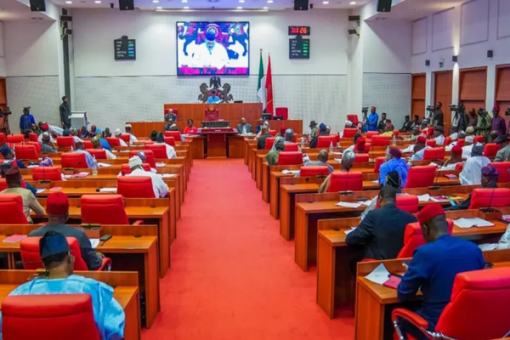The Nigerian Senate is planning to send a delegation to the United States Congress to engage lawmakers over reports accusing Nigeria of committing genocide against Christians.
Senate President Godswill Akpabio announced the plan during Thursday’s plenary while debating a motion sponsored by Borno South Senator Ali Ndume and co-sponsored by 20 other senators, mostly from the North.
Akpabio said an ad hoc committee would be constituted to meet with US legislators and “educate them” on the realities of Nigeria’s security situation. He added that the delegation’s composition would be finalised during a closed-door session.
“What is happening in the United States is of concern to Nigeria. It’s of concern to Christians. It’s of concern to Muslims because the moment they bring sanctions, sanctions breed poverty, and poverty knows no religion. Engagement will be the best approach.” Akpabio said.
He argued that the ongoing insecurity across the country was driven by terrorism and criminality, not religion.
“These terrorists are trying to terminate the lives of Nigerians and prevent us from going to the farms to produce food. We should visit our colleagues in the US and put forward the other side of the story because some people may have gone there to present a one-sided version.”
In September, the US Congress introduced a bill seeking to designate Nigeria as a “Country of Particular Concern” over alleged violations of religious freedom.
The bill—The Nigeria Religious Freedom Accountability Act, 2025 (S. 2747)—was sponsored by Senator Ted Cruz and co-sponsored by other lawmakers. It mandates the US government to identify and sanction Nigerian officials responsible for enforcing blasphemy laws.
The measure follows recommendations from the US Commission on International Religious Freedom (USCIRF), which has repeatedly called for Nigeria’s designation, accusing authorities of failing to protect religious minorities or punish perpetrators of sectarian violence.
Nigerian officials, however, reject those claims, maintaining that most violence in the country is caused by terrorism and banditry rather than religious persecution.
Several international groups, including Christian advocacy organisations, have long ranked Nigeria among the most dangerous places in the world for Christians. The 2025 World Watch List by Open Doors placed Nigeria among the top ten countries where Christians face severe persecution.
Last month, an international platform reported that terrorists killed five Christians on their farms in Nogoshe village, Gwoza Local Government Area of Borno State, and three others in the Mussa community, Askira-Uba LGA.
Akpabio rejected the narrative of a Christian genocide, saying both Christians and Muslims have suffered from insurgent attacks across the country.
“If terrorism occurs in a Christian-dominated state, most people that die will be Christians. If it occurs in a Muslim-dominated state, most of those who die will be Muslims. So, my personal opinion is that Nigerians have lost their lives as a result of insurgencies, not because of religion.”
He pointed to the South-east as an example of insecurity unrelated to faith, citing killings by the Indigenous People of Biafra (IPOB).
“The sit-at-home order has almost crippled the economy of the South-east. Is this targeted at Christians or Muslims?Nigeria has complex security situations, and we should go out there and educate people.”
Akpabio further argued that the Senate must respond strategically to counter what he described as a “one-sided” narrative abroad.
Ondo South Senator Jimoh Ibrahim supported the motion, calling for a complete review of Nigeria’s counterterrorism strategy.
“We must understand the tactics of the terrorists. Unless we can properly analyse their strategy, it will be difficult to suggest an effective counterterrorism approach.” Ibrahim said.

